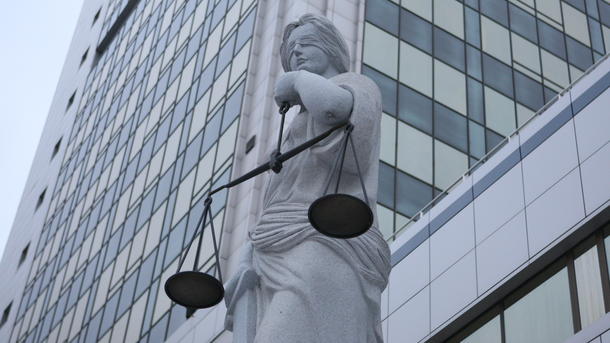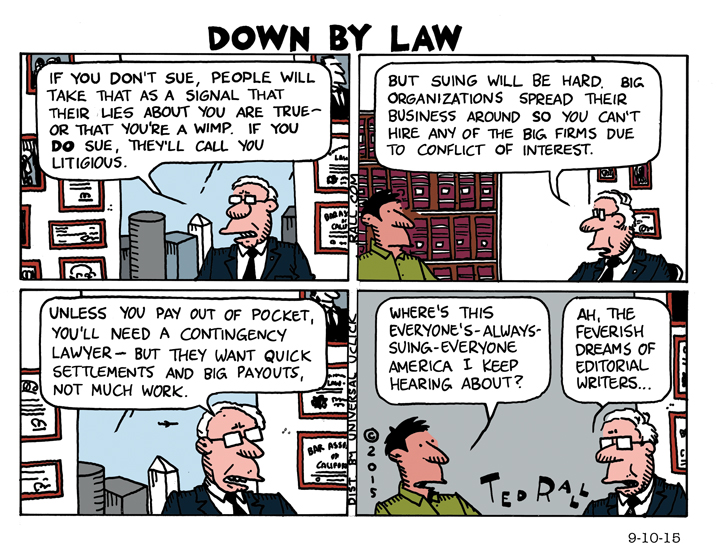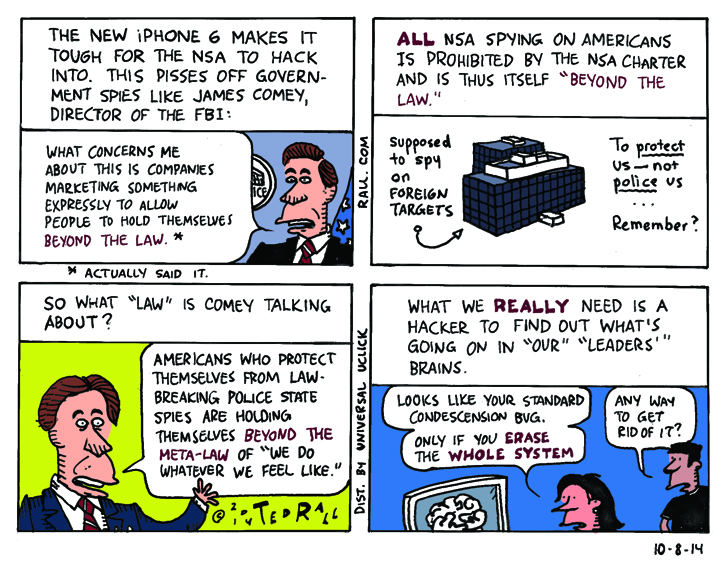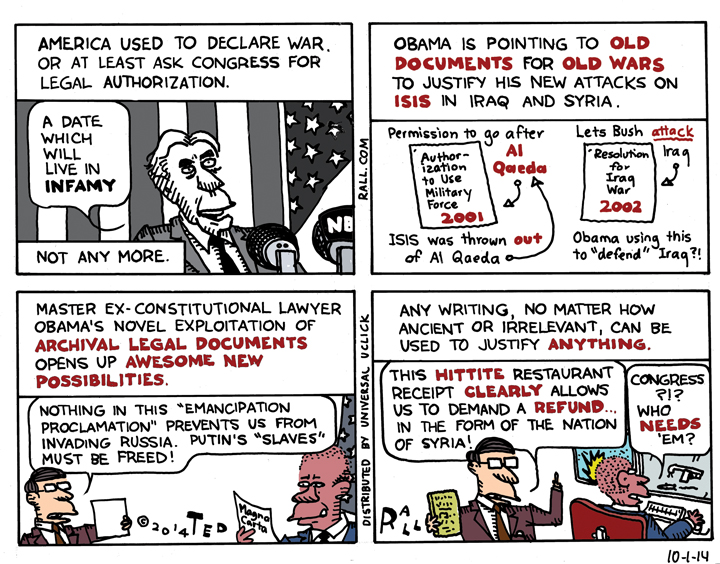
For a cartoonist, I turned out to be a fairly decent lawyer. But I didn’t want to represent myself. It took two vicious lawyers to force me into that position.
One of those lawyers was mine.
I’m suing the Times because they repeatedly, knowingly and intentionally defamed me after firing me as a favor to LAPD Chief Charlie Beck, a thin-skinned pol I’d criticized in my editorial cartoons. The paper responded by turning California’s “anti-SLAPP” law, designed to protect people like me against corporations like the Times and its parent company Tronc, on its head; this $400 million corporation is accusing me — a five-figure income cartoonist — of oppressing its First Amendment rights by using my vast wealth to intimidate them.
Before my case is allowed to begin in earnest, anti-SLAPP requires a plaintiff (me) to convince a judge that, if everything I allege in my lawsuit turns out to be true, I’d likely win before a trial jury. But anti-SLAPP is as confusing as French grammar, so many judges interpret the law much more harshly than it’s actually written.
All the lawyers I talked to told me that I’d almost certainly win at trial if my case survived anti-SLAPP and made it to a jury. Ironically, getting past anti-SLAPP would be our toughest challenge.
The lawyer who took my case agreed with this assessment. But when oral arguments for the first of the Times’ three anti-SLAPPs against me took place on June 21st in LA Superior Court, his firm inexplicably assigned a junior associate, Class of 2013, to take on Kelli Sager.
Kelli Sager, who represents the Times, is a high-powered attorney with more than three decades of courtroom experience, a senior partner at Davis Tremaine Wright, an international law firm that represents giant corporations.
I liked my junior associate. She’s smart and may someday become a great lawyer. But she was no match for a shark like Kelli Sager. Sager talked over her. My lawyer let Sager get away with one brazen lie after another, either too unprepared or timid to respond. She couldn’t even answer the judge’s simple question to walk him through what happened to prompt my lawsuit.
It was a rout. Sager was eloquent and aggressive. My lawyer couldn’t begin to articulate my case, much less sway the judge. I lost that round.
Determined not to lose the all-important important hearing number two, against the Times and Tronc, I asked my law firm to meet for a strategy session. Bafflingly, they refused to confer or to send a more senior litigator to the next one. Another defeat was guaranteed.
Then my firm fired me — days before that key anti-SLAPP hearing. I had no idea that was even a thing, that that could happen.
I swear — it wasn’t me. I was professional and polite every step of the way. I have no idea why they left me hanging.
Normally in such situations, legal experts told me, the court grants a “continuance,” legalese for a delay, to give me time to look for a new attorney and allow him or her to familiarize themselves with the case. But it helps a lot if the opposing side says they’re OK with it.
A continuance is typically freely granted, even during the most ferocious legal battles. After all, you might be the one with a family emergency or whatever next time.
But Kelli Sager smelled blood. Figuring I’d be easier to defeat without legal representation, she fought ferociously against my requests for a continuance. Thus came about the following absurdity:
I found a new lawyer. But he needed a few weeks to get up to speed. True to her standard scorched-earth approach to litigation, Sager refused to grant me the courtesy of a continuance. So I was forced to rep myself in pro per (that’s what they call pro se in California) on July 14th.
My heart was pounding as I approached the plaintiff’s table, standing parallel to Sager. And I’m an experienced speaker! I’ve held my own on FoxNews. I’ve spoken to audiences of hundreds of people. I’ve hosted talk-radio shows. Yet dropping dead of a heart attack felt like a real possibility. I can’t imagine what this would feel like for someone unaccustomed to arguing in public.
The judge asked me to proceed. I nervously worked from prepared notes, explaining why my case wasn’t a “SLAPP” (a frivolous lawsuit I didn’t intend to win, filed just to harass the Times), that the anti-SLAPP law didn’t apply. I attacked the Times’ argument that their libelous articles were “privileged” (allowed) under anti-SLAPP because they were merely “reporting” on “official police records” about my 2001 jaywalking arrest.
If they’d been “reporting,” the articles would have had to follow the Times’ Ethical Guidelines, which ban anonymous sources, require careful analysis of evidence and calling subjects of criticism for comment. They didn’t come close. These weren’t news stories or even opinion pieces; they were hit jobs.
I explained that the records weren’t official at all, the LAPD denied releasing Beck’s unprovenanced audio, which differed from the official one at LAPD HQ. Much of the discussion was about legal minutiae rather than the broad strokes of what my case is about: I wrote a blog for latimes.com, the Times edited it and posted it, Chief Beck gave the Times a blank audio they said showed I’d lied about what I wrote, I had the audio cleaned up and it showed I’d told the truth, rather than issue a retraction when they found out they were wrong the Times refused to change their behavior and continued to insist I’d lied.
There’s also the big picture: if a newspaper’s parent company sells its stock to the police, and that newspaper’s publisher is a crony of the police chief who accepts awards from the police union, how can readers trust that newspaper not to suppress criticism of the police? Do Black Lives really Matter if investigations of police brutality don’t always make it to print, if writers and cartoonists have learned they can get fired and libeled if they annoy the cops?
I will soon receive a transcript of the hearing. I will post it at Rall.com.
Sager’s counterargument boiled down to: newspapers can publish anything they want, even lies, because the First Amendment protects free speech — as if libel and defamation law don’t exist.
Her defense for the Times was not that I lied. The audio makes clear that I didn’t. Her defense, the defense for a newspaper, was that the truth doesn’t matter.
Arguments ran over two hours.
On June 21st the judge ruled against my erstwhile lawyer directly from the bench.
On July 14th, I at least gave the judge something to think about. He took the matter “under consideration.”
I await his decision.
(Ted Rall (Twitter: @tedrall) is author of “Trump: A Graphic Biography,” an examination of the life of the Republican presidential nominee in comics form. You can support Ted’s hard-hitting political cartoons and columns and see his work first by sponsoring his work on Patreon.)






